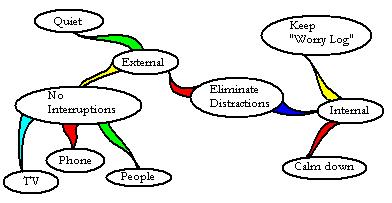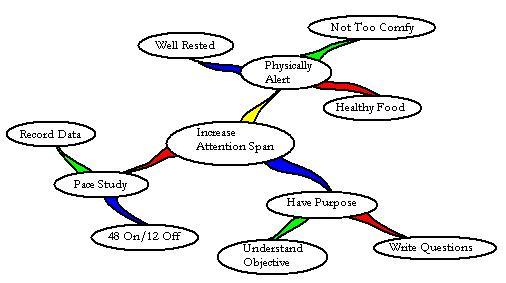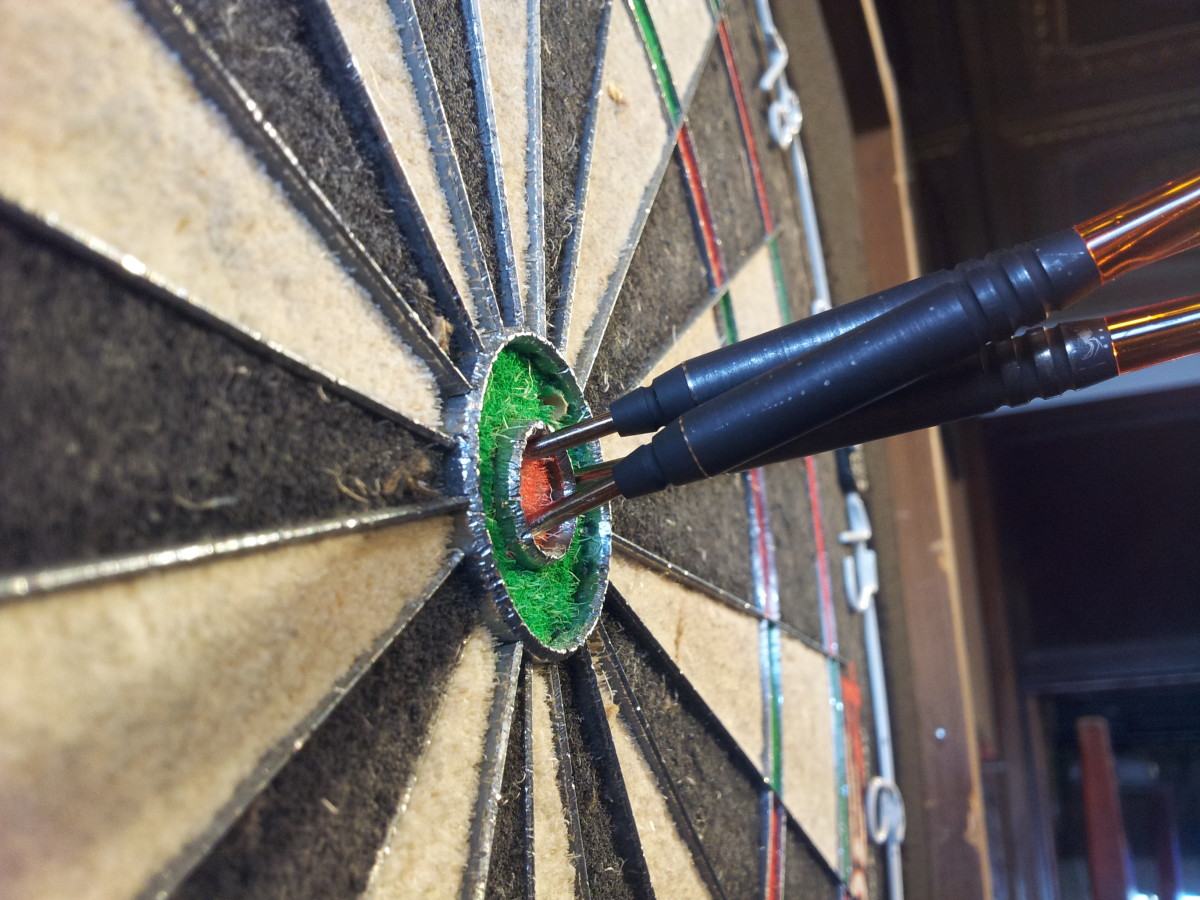How to improve your concentration skills
Being able to concentrate is a critical skill for virtually every type of learning endeavor. If acquiring knowledge or an ability can be compared to a journey to a distant city, concentration is like the fuel in your car's tank that keeps you moving closer to your destination. This skill can be learned and improved upon through focused effort. I hope you find the tips and techniques I describe below helpful. I've broken this goal of improving concentration ability into two tasks: Eliminating Distractions and Increasing Attention Span. As you'll see, the first one of these lays a firm foundation for a productive study session and the second can help you increase your brain's "mileage" to help you go the extra distance to achieve your learning goals with greater success.
Eliminating Distractions
What happens when you get distracted? Probably something like this: the distraction steals your attention from what you were doing, you stop the thing you were doing and decide to either handle or ignore the distraction, and when you come back to what you were doing you take a moment to refocus and remember where you were with respect to what you were doing. After a number of times, this can add up to a significant percentage of lost time. To reuse the journey analogy, imagine if you were to take a roadtrip from Seattle to Boston and you took a 15-minute bathroom break every 50 miles, reasoning that compared to the length of your journey, that 15 minutes was inconsequential. Well, it's about 3,000 miles from Seattle to Boston, which works out to 60 bathroom breaks if you stick to the aforementioned schedule. At 15 minutes each, you would have added an extra 15 hours to your trip! See how little things add up?
Click to expand

My "Study Music"
To the right you'll notice a mind map I drew up which shows how I classify distractions and a few general solutions. I divide distractions into external types and internal types; you got off track either because something happened or another thought preempted your thought process.
Try to eliminate as many interruptions as possible. I mention the television, the telephone, and people because they're pretty persistent attention grabbers if you don't keep them in check, but if other things are more applicable to your circumstances, like the radio or your neighbor's barking dog, then figure out a plan to remove yourself from them while you study.
I consider finding the right amount of quiet to be separate from removing interruptions because I've known people for whom an absolute lack of auditory input is bliss, and others for whom the same is...not. I turn out to be one of those who finds a little background music beneficial. You of course are the best judge as to what is right for you. You don't want something that makes you fall asleep, and yet something overly energetic is not likely to be helpful either. This may be just me, but Bach's Brandenburg Concerto on low volume in the background is very nice. Have a listen for yourself!
The other kind of distractions are the ones that, if you're like me, come right in the middle of an important thought and, like a bad houseguest, just hang around and eventually get in the way if you don't kick them out. But that's easier said than done, right? Probably, the more you try not to think about something, like the proverbial pink elephant, the more likely it is that you're going to think about it. So what do you do about stray thoughts to get them on their way?
Here's something that might work for you: keep a small notepad with you while you are studying. If a thought comes into your head that you can't shoo off because it's important and you feel the need to remember it, like that you need to go to the bank or you've finally decided what to do this weekend, write it down on the notepad so you can let it go without the fear of losing it.
Finally, being calm and relaxed helps a lot when trying to get into and stay in concentration mode. I remember once when my statistics final was in one hour and my grade hung in the balance. I concentrated like none other and actually pulled it off. The thing is, only a few days later, just about everything I crammed was gone!
Click to expand

Increasing Attention Span
This is the other part of the equation. Barring medical diagnoses of ADD or ADHD, doing the things listed below and displayed in the mind map to the right can help to increase the length of time that you are able to focus deeply on the task at hand.
Concentration requires physical alertness. If you're tired or not feeling well, chances are your concentration is going to suffer. Get a good night's rest. If tiredness is a regular problem for you, you might want to learn more about sleep hygiene. Also, while it's good to be comfortable, too much comfort, like if you study on your bed or in a nice soft easy chair, can work against you. Lastly on this topic, if you're currently living to a significant extent on fast foods and soda, try trading that out for fruits, vegetables, and more water and see if you can't feel a difference.
Here's another revelation: if you know what you're doing and why, it will be easier for you to stay on track to do it. We've all had the experience of sitting in a classroom and hearing the teacher say something like, "Make sure you all read pages 37 to 52 before next Tuesday." When you're in a situation like that and the main thing you have on your mind is getting to page 52 so you can stop, of course it's going to be an uphill battle.
Get an idea of what you want to accomplish in your study session in qualitative terms with respect to the subject matter and put it into your own words. I would even say write that objective statement down on some paper. Don't worry that your objective statement might not be exactly what you get out of your studies, what is important is that you have something in mind to look for. For instance, if I were sitting in that class mentioned earlier and the swath of pages the teacher told the class to read comprised a chapter titled "The Fall of Rome," I might, without knowing better (I haven't yet read the chapter, after all) write down my objective like so: "I will list the reasons why Rome fell." Maybe I'll be wrong. Maybe the chapter will not detail the reasons. Maybe the chapter will discuss in timeline fashion how, not why, Rome fell. Right or wrong, this approach is going to help me more than if I just sit down and go through the pages until I hit 52.
As you're reading, make an effort to come up with questions. To try to do this for every statement would probably be quite distracting, but questioning what you are reading is an effective way to keep your head in the material, especially when a little further down the page or on one of the following pages you find the answer to your question. It's like a little reward, and who doesn't like rewards, especially when straining their brain?
The last tip I would suggest is that you pace yourself. When I talk about increasing attention span, I'm not suggesting that this can be taken to superhuman extremes. Your results may differ, but before you determine that, I suggest a baseline approach of applying these tips to study in blocks of 48 minutes followed by a break of 12 minutes. This keeps things in clean blocks of one hour each. You might want to write down how you think your concentration was and what you should modify to suit your needs. In the end, this feedback loop of monitoring your own concentration performance and making adjustments may bring you to a more comprehensive set of concentration-improving tips, but the items in this hub can offer you a good jumping off point. Good luck!









